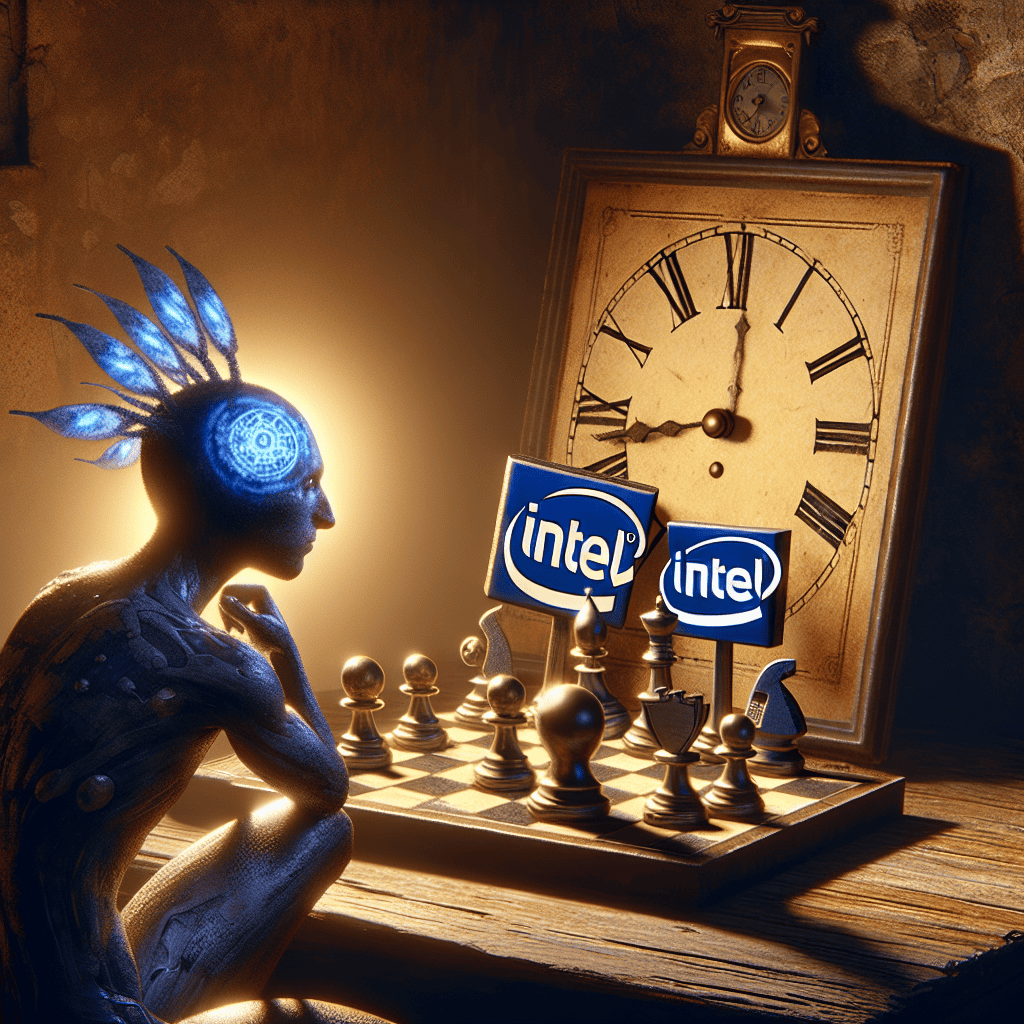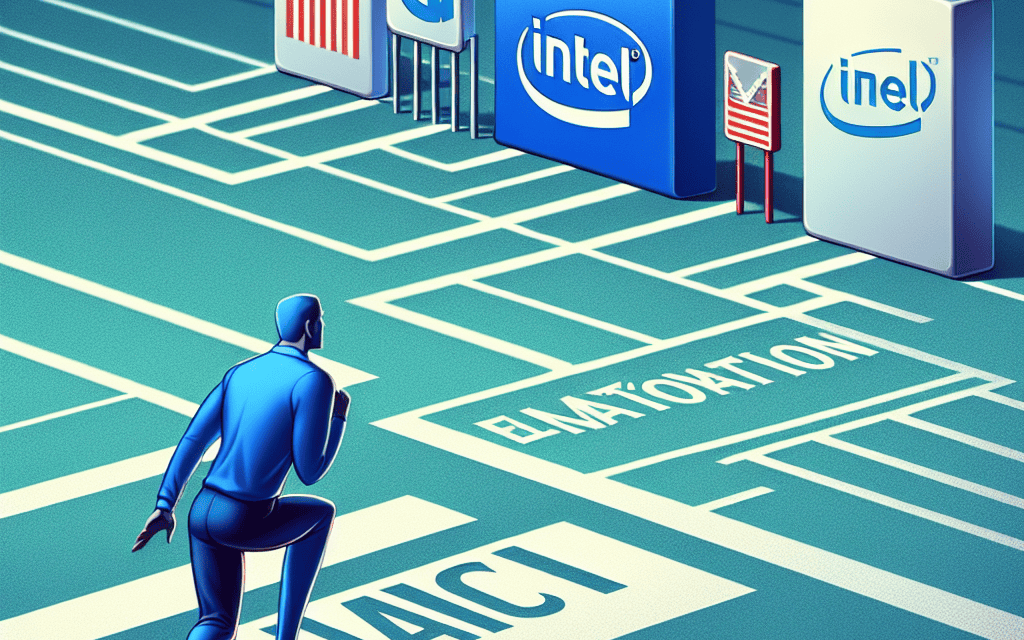“Qualcomm Holds Its Cards: Awaiting Election Outcome for Intel Decision”
Introduction
Qualcomm, a leading semiconductor and telecommunications equipment company, is reportedly adopting a cautious approach regarding its potential acquisition or strategic move involving Intel, another major player in the technology sector. According to sources familiar with the matter, Qualcomm is waiting for the outcome of the upcoming U.S. elections before making any significant decisions. This strategic pause is likely due to the potential regulatory and policy changes that could arise from the election results, which may impact the business landscape and influence Qualcomm’s decision-making process. The move underscores the importance of political and economic stability in corporate strategy, particularly in industries heavily influenced by government regulations and international trade policies.
Qualcomm’s Strategic Timing: Analyzing the Impact of US Elections on Business Decisions
In the ever-evolving landscape of the semiconductor industry, strategic decision-making is crucial for maintaining a competitive edge. Qualcomm, a leading player in this sector, is reportedly adopting a cautious approach by waiting for the outcome of the upcoming US elections before making any significant moves regarding Intel. This decision underscores the intricate relationship between political developments and corporate strategies, highlighting how external factors can influence business operations.
The semiconductor industry is highly sensitive to geopolitical shifts, and companies like Qualcomm must navigate these complexities with precision. The US elections, a pivotal event with far-reaching implications, can potentially reshape the regulatory and economic environment in which these companies operate. By delaying its decision on Intel until after the elections, Qualcomm is demonstrating a strategic foresight that acknowledges the potential for policy changes that could impact its business interests.
One of the primary considerations for Qualcomm is the regulatory landscape. The outcome of the elections could lead to shifts in antitrust policies, trade regulations, and technology export controls. These factors are critical for a company like Qualcomm, which operates on a global scale and relies heavily on international markets. A change in administration could bring about new policies that either facilitate or hinder Qualcomm’s strategic objectives, particularly in relation to its interactions with Intel, a key competitor and collaborator in various technological domains.
Moreover, the elections could influence the broader economic climate, affecting consumer demand and investment trends. Qualcomm’s decision to wait reflects an understanding that economic policies, such as tax reforms and infrastructure spending, could alter market dynamics. By aligning its strategic decisions with the post-election economic landscape, Qualcomm aims to position itself advantageously, ensuring that its actions are in sync with the prevailing economic conditions.
In addition to regulatory and economic considerations, Qualcomm must also account for potential shifts in international relations. The semiconductor industry is deeply intertwined with global supply chains, and any changes in trade policies or diplomatic relations could have significant repercussions. The US elections could lead to a reevaluation of international alliances and trade agreements, impacting Qualcomm’s ability to source materials and access foreign markets. By postponing its decision on Intel, Qualcomm is allowing itself the flexibility to adapt to any changes in the geopolitical landscape that may arise from the elections.
Furthermore, Qualcomm’s strategic timing reflects a broader trend among corporations to integrate political risk assessment into their decision-making processes. In an era where political developments can have immediate and profound effects on business operations, companies are increasingly recognizing the importance of aligning their strategies with the political climate. Qualcomm’s approach serves as a testament to the growing recognition of the interconnectedness between politics and business, emphasizing the need for agility and adaptability in an uncertain world.
In conclusion, Qualcomm’s decision to wait for the US elections before making a move on Intel is a strategic maneuver that highlights the complex interplay between political developments and corporate strategies. By considering the potential impact of regulatory changes, economic shifts, and international relations, Qualcomm is positioning itself to navigate the post-election landscape effectively. This approach not only underscores the importance of strategic timing in the semiconductor industry but also reflects a broader trend of integrating political risk assessment into business decision-making. As the elections unfold, Qualcomm’s actions will be closely watched, serving as a barometer for how companies can adapt to the ever-changing political and economic environment.
The Intersection of Politics and Technology: Qualcomm’s Calculated Wait
In the rapidly evolving landscape of technology, where innovation and strategic maneuvers often dictate market leadership, Qualcomm’s recent decision to delay any potential acquisition of Intel’s assets until after the upcoming U.S. election underscores the intricate interplay between politics and technology. This calculated wait reflects a broader trend where major tech companies are increasingly factoring political climates into their strategic decisions, recognizing that regulatory environments and government policies can significantly impact their operations and growth trajectories.
Qualcomm, a leading player in the semiconductor industry, has long been at the forefront of technological advancements, particularly in mobile communications and 5G technology. The company’s interest in Intel’s assets, particularly those related to its modem business, is not surprising given Qualcomm’s strategic focus on expanding its capabilities and market share in the 5G arena. However, the decision to hold off on any acquisition until after the election highlights the potential influence of political outcomes on business strategies.
The U.S. election, with its potential to reshape regulatory frameworks and trade policies, presents a significant variable for companies like Qualcomm. The outcome could lead to changes in antitrust regulations, trade agreements, and international relations, all of which could affect the feasibility and desirability of such a major acquisition. By waiting, Qualcomm is positioning itself to better assess the post-election landscape, ensuring that any move it makes is aligned with the prevailing political and economic conditions.
Moreover, this decision reflects a broader awareness within the tech industry of the increasing scrutiny from regulators and lawmakers. In recent years, there has been a growing focus on the power and influence of major tech companies, with calls for stricter regulations and oversight. For Qualcomm, proceeding with a significant acquisition in a potentially volatile regulatory environment could invite additional scrutiny and challenges. By delaying its decision, the company can better navigate these complexities, potentially avoiding regulatory hurdles that could arise from a hasty move.
In addition to regulatory considerations, the geopolitical implications of such an acquisition cannot be overlooked. The semiconductor industry is a critical component of national security, and any significant consolidation within this sector is likely to attract attention from government bodies concerned with maintaining technological leadership and security. Qualcomm’s decision to wait may also be influenced by the need to carefully manage these geopolitical dynamics, ensuring that any acquisition aligns with broader national interests.
Furthermore, the decision to delay reflects a strategic patience that is often necessary in the high-stakes world of technology mergers and acquisitions. By waiting, Qualcomm can gather more information, assess potential risks, and develop a more comprehensive strategy that takes into account not only the immediate benefits of acquiring Intel’s assets but also the long-term implications for its business and the industry as a whole.
In conclusion, Qualcomm’s decision to wait for the U.S. election before making a move on Intel’s assets is a testament to the complex relationship between politics and technology. It highlights the need for tech companies to be acutely aware of the political environment and to incorporate this awareness into their strategic planning. As the intersection of politics and technology continues to evolve, companies like Qualcomm must remain agile and informed, ensuring that their decisions are not only driven by technological and market considerations but also by the broader political and regulatory context in which they operate.
How US Elections Influence Corporate Strategies: A Case Study of Qualcomm
In the intricate world of corporate strategy, the influence of political events, particularly elections, cannot be understated. The case of Qualcomm, a leading player in the semiconductor industry, provides a compelling example of how U.S. elections can shape corporate decision-making. As reports suggest, Qualcomm is contemplating a strategic move involving Intel, another giant in the tech industry, but is opting to wait until after the U.S. elections to finalize its decision. This approach underscores the profound impact that political climates can have on corporate strategies.
To understand Qualcomm’s cautious stance, it is essential to consider the broader context in which businesses operate. Elections often bring about shifts in regulatory policies, trade agreements, and economic strategies, all of which can significantly affect corporate operations. For a company like Qualcomm, which is deeply embedded in global supply chains and reliant on international markets, the outcome of an election could alter the landscape in which it competes. By waiting for the election results, Qualcomm is positioning itself to better navigate potential changes in policy that could affect its strategic interests.
Moreover, the semiconductor industry is particularly sensitive to political changes due to its critical role in national security and technological advancement. The U.S. government has increasingly focused on bolstering domestic semiconductor production to reduce reliance on foreign suppliers. This focus has led to initiatives such as the CHIPS Act, which aims to incentivize semiconductor manufacturing within the United States. Depending on the election outcome, the level of support and funding for such initiatives could vary, influencing Qualcomm’s strategic decisions regarding partnerships and investments.
In addition to regulatory considerations, trade policies are another area where election outcomes can have significant implications. The semiconductor industry is heavily dependent on international trade, with complex supply chains spanning multiple countries. Changes in trade agreements or tariffs could impact Qualcomm’s cost structures and market access, making it prudent for the company to await the election results before committing to a major move involving Intel. By doing so, Qualcomm can ensure that its strategy aligns with the prevailing trade environment, minimizing risks and maximizing opportunities.
Furthermore, the political climate can also affect investor sentiment and market conditions. Elections often lead to fluctuations in stock markets as investors react to potential policy changes. For Qualcomm, a company whose stock performance is closely watched by investors, the election outcome could influence its valuation and access to capital. By delaying its decision until after the elections, Qualcomm can better assess market conditions and make a more informed choice regarding its strategic direction.
In conclusion, Qualcomm’s decision to wait for the U.S. election results before proceeding with a potential move involving Intel highlights the intricate relationship between politics and corporate strategy. The outcome of the election could bring about changes in regulatory policies, trade agreements, and market conditions, all of which are critical factors for a company operating in the semiconductor industry. By taking a cautious approach, Qualcomm is demonstrating a strategic foresight that allows it to adapt to the evolving political landscape, ensuring that its decisions are aligned with the best interests of the company and its stakeholders. This case study serves as a reminder of the profound influence that political events can have on corporate strategies, particularly in industries that are closely tied to national interests and global markets.
Qualcomm and Intel: Navigating Business Moves Amid Political Uncertainty

In the ever-evolving landscape of the semiconductor industry, strategic decisions are often influenced by a myriad of factors, including technological advancements, market dynamics, and geopolitical considerations. Recently, Qualcomm, a leading player in the semiconductor sector, has been reported to be contemplating a significant business move involving Intel. However, the company appears to be adopting a cautious approach, choosing to wait for the outcome of the upcoming U.S. election before making any definitive decisions. This decision underscores the intricate interplay between business strategy and political uncertainty, highlighting the challenges that companies face in navigating such a complex environment.
Qualcomm’s hesitance to proceed with its plans involving Intel can be attributed to the potential policy shifts that may arise from the election results. The semiconductor industry, being a critical component of the global technology infrastructure, is highly sensitive to regulatory changes and international trade policies. A change in administration could lead to new regulations or alterations in trade agreements, which might significantly impact the operational landscape for companies like Qualcomm and Intel. By waiting for the election results, Qualcomm aims to mitigate the risks associated with unforeseen policy changes that could affect its strategic objectives.
Moreover, the relationship between Qualcomm and Intel is multifaceted, involving both competition and collaboration. As two of the most prominent players in the semiconductor industry, their interactions are closely watched by industry analysts and stakeholders. Any potential move by Qualcomm concerning Intel could have far-reaching implications, not only for the two companies but also for the broader industry. Therefore, it is crucial for Qualcomm to carefully assess the political climate and its potential impact on the industry before making any significant decisions.
In addition to political considerations, Qualcomm’s decision-making process is likely influenced by the current state of the semiconductor market. The industry has been experiencing rapid growth, driven by increasing demand for advanced technologies such as 5G, artificial intelligence, and the Internet of Things. This growth presents both opportunities and challenges for companies like Qualcomm and Intel, as they strive to maintain their competitive edge while navigating supply chain disruptions and evolving consumer demands. By delaying its decision until after the election, Qualcomm may be seeking to gain a clearer understanding of the market trajectory and align its strategy accordingly.
Furthermore, the global semiconductor supply chain has been under significant strain due to various factors, including the COVID-19 pandemic and geopolitical tensions. These disruptions have highlighted the importance of strategic partnerships and collaborations in ensuring supply chain resilience. Qualcomm’s potential move involving Intel could be part of a broader strategy to strengthen its position in the supply chain and enhance its ability to respond to future challenges. However, such a move requires careful consideration of the political and economic landscape, which is why the company is opting to wait for the election results.
In conclusion, Qualcomm’s decision to delay its move involving Intel until after the U.S. election reflects the complex interplay between business strategy and political uncertainty. By taking a cautious approach, Qualcomm aims to navigate the potential risks associated with policy changes and market dynamics, ensuring that its strategic objectives are aligned with the evolving landscape. As the semiconductor industry continues to grow and evolve, companies like Qualcomm and Intel must remain agile and adaptable, leveraging their strengths to capitalize on emerging opportunities while mitigating potential challenges.
The Role of Political Climate in Shaping Tech Industry Decisions
In the rapidly evolving landscape of the technology industry, strategic decisions by major corporations are often influenced by a myriad of factors, including the prevailing political climate. A recent example of this dynamic is Qualcomm’s reported decision to delay any potential acquisition or partnership with Intel until after the upcoming U.S. elections. This move underscores the significant role that political considerations play in shaping the strategies of tech giants.
The intersection of politics and technology is not a new phenomenon. However, in recent years, the stakes have become increasingly high as governments around the world grapple with issues such as data privacy, national security, and technological sovereignty. In the United States, the political environment has been particularly volatile, with shifting policies and regulatory frameworks that can have profound implications for the tech industry. Consequently, companies like Qualcomm must navigate these uncertainties with caution.
Qualcomm’s decision to wait until after the election to make a move on Intel is a strategic one, reflecting the company’s need to assess the potential impact of the election’s outcome on its business interests. The results could lead to changes in regulatory policies, trade agreements, and international relations, all of which could affect Qualcomm’s operations and its competitive position in the market. By postponing any major decisions, Qualcomm is allowing itself the flexibility to adapt to the post-election landscape, whatever it may be.
Moreover, the potential acquisition or partnership with Intel is a significant undertaking that would require careful consideration of various factors, including antitrust regulations and the competitive dynamics of the semiconductor industry. The political climate can influence these factors in several ways. For instance, a government that prioritizes national security might scrutinize such a deal more closely, given the strategic importance of semiconductor technology. Alternatively, a government focused on fostering innovation and competition might be more inclined to approve the transaction.
In addition to regulatory considerations, the political climate can also affect market conditions and investor sentiment. Elections often bring about economic uncertainty, which can lead to fluctuations in stock prices and investment flows. For a company like Qualcomm, which operates in a highly competitive and capital-intensive industry, maintaining investor confidence is crucial. By waiting until after the election, Qualcomm can better gauge the market’s reaction and make more informed decisions about its strategic direction.
Furthermore, the outcome of the election could have implications for U.S.-China relations, which are particularly relevant for Qualcomm and Intel, given their significant business interests in China. The ongoing trade tensions between the two countries have already impacted the tech industry, with tariffs and export restrictions affecting supply chains and market access. A change in administration could lead to a shift in trade policies, potentially opening up new opportunities or presenting new challenges for companies operating in this space.
In conclusion, Qualcomm’s decision to delay any potential move on Intel until after the U.S. elections highlights the critical role that the political climate plays in shaping the strategic decisions of tech companies. By carefully considering the potential implications of the election’s outcome, Qualcomm is positioning itself to navigate the complexities of the post-election environment effectively. This approach underscores the importance of political foresight in the tech industry, where the interplay between politics and business can have far-reaching consequences.
Qualcomm’s Decision-Making Process: Balancing Business and Political Factors
In the complex landscape of global technology, companies like Qualcomm must navigate a myriad of factors when making strategic decisions. Recently, reports have surfaced suggesting that Qualcomm is contemplating a significant move involving Intel, but is opting to wait until after the upcoming U.S. elections to finalize any decisions. This approach underscores the intricate balance between business imperatives and political considerations that major corporations must maintain.
Qualcomm, a leader in semiconductor and telecommunications equipment, is no stranger to the influence of political dynamics on business operations. The company’s decision to delay any potential move involving Intel until after the elections highlights the importance of political stability and policy direction in shaping corporate strategies. The outcome of the elections could have profound implications for regulatory environments, trade policies, and international relations, all of which are critical factors for a company with global operations like Qualcomm.
Moreover, the semiconductor industry is currently experiencing a period of significant transformation and uncertainty. With the ongoing global chip shortage, companies are under pressure to secure their supply chains and maintain competitive advantages. In this context, any strategic move involving a major player like Intel could have far-reaching consequences. By waiting for the election results, Qualcomm is likely seeking to ensure that its decisions are informed by the most current and relevant political and economic conditions.
In addition to political considerations, Qualcomm’s decision-making process is undoubtedly influenced by business factors. The potential collaboration or competition with Intel involves evaluating market opportunities, technological synergies, and financial implications. Qualcomm must assess how such a move would align with its long-term strategic goals, including its ambitions in areas like 5G technology, artificial intelligence, and automotive applications. The company must also consider the competitive landscape, as the semiconductor industry is characterized by rapid innovation and intense rivalry.
Furthermore, Qualcomm’s decision to wait reflects a broader trend among multinational corporations to integrate geopolitical analysis into their strategic planning. In an increasingly interconnected world, companies must be attuned to the geopolitical environment and its potential impact on business operations. This includes understanding how changes in government leadership and policy can affect trade relations, regulatory frameworks, and market access.
The decision to delay any move involving Intel until after the elections also suggests a cautious approach to risk management. By waiting, Qualcomm can mitigate potential risks associated with political uncertainty and ensure that its actions are aligned with the prevailing regulatory and economic landscape. This approach allows the company to make more informed decisions that are likely to yield sustainable benefits in the long term.
In conclusion, Qualcomm’s decision to wait for the U.S. election results before making any significant move involving Intel illustrates the complex interplay between business and political factors in corporate decision-making. By considering both the immediate and long-term implications of its actions, Qualcomm is positioning itself to navigate the challenges and opportunities of the global semiconductor industry effectively. As the world continues to evolve, companies like Qualcomm must remain agile and responsive to the dynamic environment in which they operate, balancing business objectives with political realities to achieve success.
The Future of Qualcomm and Intel: Potential Outcomes Post-US Election
In the rapidly evolving landscape of technology, the strategic decisions made by industry giants like Qualcomm and Intel can have far-reaching implications. As the world watches the unfolding political climate in the United States, Qualcomm is reportedly adopting a cautious approach, choosing to wait for the outcome of the upcoming US election before making any significant moves regarding Intel. This decision underscores the intricate relationship between politics and business, particularly in the tech sector, where regulatory changes and international trade policies can dramatically alter the playing field.
Qualcomm’s hesitance to act before the election highlights the uncertainty that currently pervades the industry. The US government has a significant influence on the tech sector, with policies that can either foster innovation or impose restrictions. For instance, changes in trade agreements or tariffs can impact supply chains and cost structures, while shifts in regulatory frameworks can affect everything from intellectual property rights to antitrust considerations. By waiting for the election results, Qualcomm is positioning itself to better navigate these potential changes, ensuring that any strategic decisions align with the new political landscape.
Moreover, the relationship between Qualcomm and Intel is complex and multifaceted. Both companies are leaders in semiconductor technology, yet they operate in different niches within the market. Qualcomm is renowned for its advancements in mobile technology, particularly in the development of processors for smartphones and other portable devices. Intel, on the other hand, has a stronghold in the personal computer and data center markets. Any potential collaboration or competition between these two giants could reshape the industry, influencing everything from product development to market share.
The outcome of the US election could also impact international relations, which in turn could affect Qualcomm’s and Intel’s global operations. For example, the ongoing trade tensions between the US and China have already had significant repercussions for tech companies, with tariffs and export restrictions creating challenges for those with international supply chains. A change in administration could lead to a shift in these policies, either easing tensions and opening up new opportunities for collaboration or further complicating the landscape with additional restrictions.
Furthermore, the election results could influence domestic policies that affect the tech industry. Issues such as data privacy, cybersecurity, and net neutrality are all subject to political debate, and the direction taken by the new administration could have significant implications for companies like Qualcomm and Intel. By waiting to see how these issues are addressed, Qualcomm can make more informed decisions about its future strategy, ensuring that it remains competitive in a rapidly changing environment.
In conclusion, Qualcomm’s decision to wait for the US election before making any moves regarding Intel is a strategic one, reflecting the complex interplay between politics and business in the tech industry. By taking a cautious approach, Qualcomm is positioning itself to adapt to whatever changes may come, ensuring that it can continue to innovate and thrive in a competitive market. As the election approaches, the tech world will be watching closely, aware that the results could herald a new era of opportunities and challenges for industry leaders like Qualcomm and Intel.
Q&A
1. **What is Qualcomm’s strategy regarding Intel?**
Qualcomm is reportedly waiting for the outcome of the US election before making any decisions about a potential move involving Intel.
2. **Why is Qualcomm waiting for the US election results?**
The company is likely assessing the political and regulatory environment post-election, which could impact any strategic decisions involving Intel.
3. **What type of move is Qualcomm considering with Intel?**
The specifics of the move are not detailed, but it could involve a partnership, acquisition, or other strategic collaboration.
4. **How might the election results influence Qualcomm’s decision?**
Changes in administration could lead to shifts in regulatory policies, trade relations, and market conditions, all of which could affect Qualcomm’s strategy.
5. **What are the potential benefits for Qualcomm in waiting?**
By waiting, Qualcomm can make a more informed decision based on the new political landscape, potentially avoiding risks associated with regulatory changes.
6. **Has Qualcomm made any official statements about this strategy?**
There are no official statements from Qualcomm confirming this strategy; the information is based on reports and speculation.
7. **What impact could this decision have on the tech industry?**
A significant move involving Qualcomm and Intel could reshape competitive dynamics in the semiconductor industry, affecting market shares and innovation.
Conclusion
Qualcomm’s decision to wait for the outcome of the US election before making a move on Intel suggests that the company is considering the potential impact of political and regulatory changes on its strategic decisions. The election results could influence trade policies, antitrust regulations, and other factors that might affect Qualcomm’s business environment and competitive landscape. By delaying its decision, Qualcomm is likely seeking to mitigate risks and ensure that any move it makes aligns with the new political and economic context. This cautious approach underscores the importance of external factors in corporate strategy and highlights the interconnectedness of business decisions and political developments.





